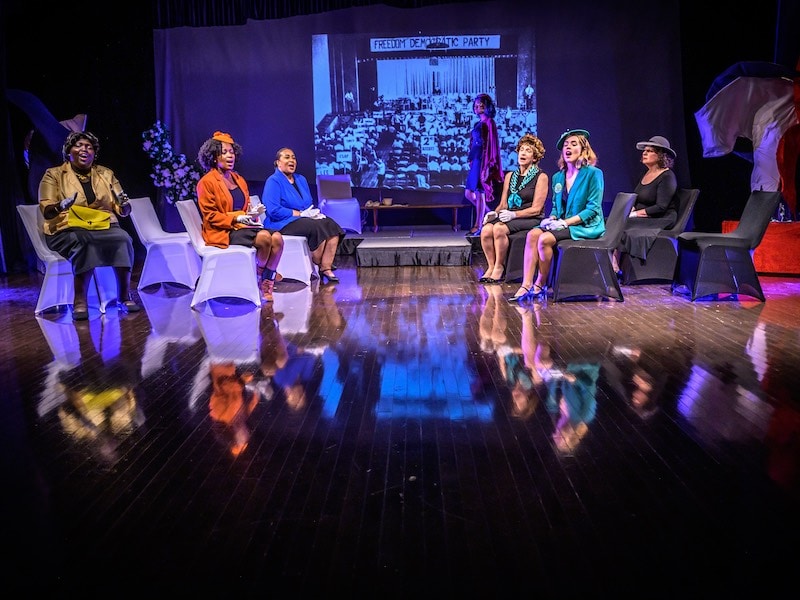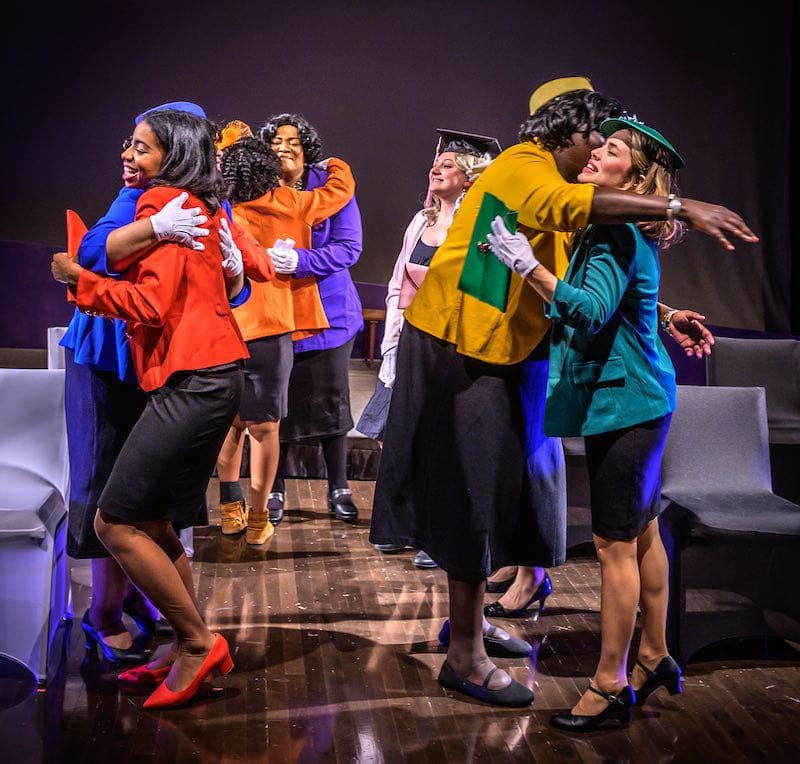Wednesdays in Mississippi, a world-premiere play by Nicole Burton, shows the difference that women made collectively and individually to uproot longstanding racist societal barriers in the 1960s during Freedom Summer and beyond. The show sheds light on a little-known group of civic-minded Northern-based women who traveled weekly to various Southern sites, mostly in Mississippi, encouraging, funding, and coaching local groups to change. Nurtured by Pipeline Playwrights, Burton adapted the book Wednesdays in Mississippi by Debbie Z. Harwell telling about these unsung “s/heros” who made differences in lives, one vote and freedom school at a time.
With white supremacists in charge of all of the basic societal systems, Southern Black communities were often relegated to near-sharecropping status with nowhere to turn for generations. Getting quality education and voting rights were instrumental to “uplift the race,” and the Wednesday group was determined to help the downtrodden populations secure their civic and human rights in the fight for social justice.

The women would fly to rural Mississippi cities to gather on Wednesday to improve conditions for local African Americans and return on Thursday before the weekend. The play also sheds light on the interactions with members of the Southern Christian Leadership Conference (SCLC), Student Nonviolent Coordination Committee (SNCC), along with the NAACP trying to make a difference. The stakes couldn’t be higher with brutal retaliation at every turn. In one poignant scene, the characters portray SNCC college students in practice sessions taking turns screaming and baiting each other while the partner lay on the floor limp to protect themselves from the pummeling.
A subtitle for the book — Proper Ladies Working for Radical Change – provides a clue about the fascinating background. These are well-heeled society women who refused to look the other way when confronted with the wretched conditions of Southern citizens and rampant disregard for basic human rights. Perfectly coiffed and highly coutured down to pillbox hats, white gloves, and pumps, these courageous women put their lives on the line and endured treacherous conditions trying to secure voting rights and quality education for poor Southern families.
Many of us might be familiar with Dorothy Height, an early president of the National Council of Negro Women and civil rights trailblazer who has been a mainstay in the movement since the beginning. This show gives some insight into her from behind the scenes. For example, as the dynamic force orchestrating the Wednesday group, Dorothy Height teamed with Polly Speigel Cowan, a Jewish New York journalist and philanthropist who had a family inheritance from the Speigel catalog. Together they organized and orchestrated the Wednesday Group. Corisa Myers as Height and Isha Raj-Silverman as Cowan confide easily with each other as they assign ladies to the predetermined cities, organize the details of such a massive undertaking, and deal with the reactions and pushback for their efforts.
Kellie Santos-DeJesus is a compelling Fannie Lou Hamer, relaying just the right amount of intensity for Hamer’s televised speech to a committee of the Democratic National Convention that made history. The play effectively relayed the honest concern that some had about Hamer being an uneducated woman without the polish and sophistication of middle-class representatives. Santos-DeJesus’ rendition put those concerns to rest. Jacqueline Youm displays her usual powerful force as Doris Wilson, Tuskegee graduate and summer volunteer. Her near baritone vocals helped to anchor the lower register of “We Who Believe in Freedom Shall Not Rest,” one of the several freedom songs that stayed with me long after the show was over.

Keen direction by Rikki Howie Lacewell kept the energy flowing along the bountiful number of scenes with actors portraying various characters and scenarios and the setting shifting from Northern strategic gatherings to back rooms and Southern porches. The actors relay the importance of relying on each other for behind-the-scenes information and trust while traveling down highways that could have life-and-death consequences. For example, they anxiously await news about a fellow several had met as part of the training and preparation who disappeared riding with two others on those same highways — Mickey Schwerner, James Chaney, and student volunteer Andrew Goodman.
Sound and projections designer Janice Rivera set the tone for the entire show with the full taped rendition of Nina Simone’s “Mississippi Goddam.” Simone wrote the song in reaction to the Birmingham church bombings that killed and maimed children and parishioners. The devastating lyrics juxtaposed with the bouncy beat delivered with her barely contained seething rage make for a stunning opening. Music also included a jazzy blues guitar that nestled through the transitions. Costumes by Shemika Reneé depicted an earlier era of full-bodied skirts, church lady hats, pumps (sometimes matching the attire color), and of course dainty white gloves. Scenic design by James Raymond used white fabric-draped chairs that could be moved around for versatile use along a raised set.
Wednesdays in Mississippi is presented as part of Pipeline Playwrights’ Our Time, Our Stories Series. Pipeline’s mission is to incubate and develop “original plays about women who overcome historical, social, and legal barriers to claim victory in their personal and public domains.” The word is out and audiences have been finding their way to Joe’s Emporium to witness this legacy production. As a premiere, the show is still working through the organization and flow of its abundant material, but the incredible content, design, and performances are more than enough reason to make the trip.
In addition to shedding light on important social history, urgently important these days, Wednesdays in Mississippi is a reminder of how ordinary people can take a stand, remain steadfast for social justice, and keep going no matter what.
Running Time: Two hours and 20 minutes, including one 15-minute intermission.
Wednesdays in Mississippi plays through November 19, 2023, presented by Pipeline Playwrights performing at Joe’s Movement Emporium, 3309 Bunker Hill Road, Mt. Rainier, MD. Purchase tickets ($25, general admission; $15, student) online.
The program for Wednesdays in Mississippi is online here.
For information about streaming opportunities to see the show in January 2024, visit Pipeline Playwrights.
COVID Safety: For everyone’s safety, masks are recommended.
Wednesdays in Mississippi by Nicole Burton
Based on and adapted from the book by Debbie Z. Harwell
Wednesdays in Mississippi — Proper Ladies Working for Radical Change, Freedom Summer 1964
CAST
Corisa Myers (Dorothy Height)
Jacqueline Youm (Doris Wilson)
Isha Raj-Silverman (Polly Cowan)
Maryanne Henderson (Susie Goodwillie)
Danielle Curry (Clarie Collins-Harvey)
Sue Struve (Ann Hewitt)
Mara Rosenberg (Lillian Burnstein)
Celia Richardson (Linda Davis)
Tiana Lockhart (Prathia Hall)
Kellie Santos-DeJesus (Fannie Lou Hamer)
CREATIVE TEAM
Director: Rikki Howie Lacewell
Assistant Director/ Assistant Stage Manager:
Scenic Designer: James Raymond
Technical Director: Justin Nepomuceno
Costume & Hair Designer: Shemika Reneé
Lighting Designer: Emily Pan
Sound & Projections Designer: Janice Rivera
Musical Director: Miles Spicer
Videographer & Editor: Kayode Kendall
Stage Manager: Sophia Menconi





Wonderful combination of history–with lots of detail about an almost forgotten chapter in the lives of the ladies who lunched, but who also spent their legacies helping others in need–along with the critique. Many thanks!